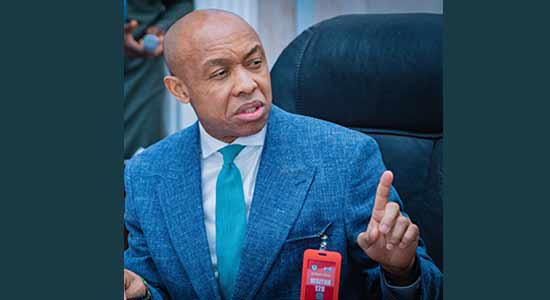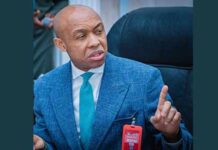Abdul Oroh is an unlikely avatar of the Nigerian dream. An Afenmai from Ivbiaro in Owan West Local Government Area of Edo State in the south-south of Nigeria, Abdul had the privilege of seeing Nigeria’s promise at independence and its descent to the edge of the proverbial precipice. Born in August 1960, he was less than two months old at the celebrations when the country attained independence on 1 October 1960.
Six and a half decades later, Abdul has worked his way through many careers, managing not to quit any. After a decade as a senior journalist and editor in some Nigeria’s leading newspapers (including the Guardian and Vanguard), Abdul spent the next decade leading Nigeria’s best known human rights organization, the Civil Liberties Organisation (CLO) during and after uniformed military rule. He then went into active politics, becoming elected as a member of the House of Representatives on the platform of the Peoples’ Democratic Party (PDP). Thereafter, he joined the executive arm of government at the state level, becoming the longest serving commissioner in the administration of Adams Oshiomhole in Edo State. Abdul trained as a lawyer and remains in active legal practice.
Abdul’s life as a serial detainee began under President Shehu Shagari. On the day that the NECOM House – headquarters of Nigeria’s telecommunications monopoly, NITEL – went down in a suspected arson in January 1983, he was a reporter on the beat when the then Chair of NITEL, Dr. Ibrahim Tahir, arrived the scene of the fire. As Dr. Tahir made his way into the burning building, Abdul joined the scrum, a reporter-witness in the company of Piranhas. It was not long before Dr. Tahir noticed him.
When he confessed to being a reporter, Dr Tahir asked the police to arrest him. His first experience of detention lasted 16 days. Over the next one and a half decades, Abdul was detained successively by the military regimes of Muhammadu Buhari, Ibrahim Babangida, and Sani Abacha for his work both as a journalist and a human rights advocate.
Along the way, Abdul Oroh came across, interviewed and worked with many of the figures who defined post-colonial Nigeria. He was friends with Fela Anikulapo-Kuti and close collaborator with Fela’s brother, Beko, in the fight against military rule. Legendary lawyer and Senior Advocate of Nigeria (SAN), Gani Fawehinmi, chaired his wedding reception, and he counts another celebrated SAN, Olisa Agbakoba, among his closest friends.
Abdul was a confidante of Alhaji MKO Abila as well as an ally of Bola Ahmed Tinubu in exile. Having survived military mis-rule, Abdul served in the National Assembly as a member of Olusegun Obasanjo’s PDP and in the Edo State cabinet first as a member of Bola Ahmed Tinubu’s Action Congress of Nigeria (ACN); and then of Muhammadu Buhari’s All Progressives Congress (APC).
In his memoirs just published, Abdul exhales with a tale of what he has learnt from a life of unusual coalitions and coincidences. The title, Demonstration of Craze, is a homage to his friend, celebrated musician Fela Anikulapo-Kuti. The book advertises itself as a tale about “Struggles and Transition to Democracy in Nigeria.” In reality, it is more a story about the triumphs and tragedies of post-independence Nigeria told from the vintage a ringside seat by a master craftsman in the art of story-telling.
The 611 pages of the book weighing 1.1 kilogrammes could arguably have been two volumes instead of one and could put off all but the most committed of book-lovers, but the narration is both authentic and fast-paced to the point of being totally spell-binding.
Demonstration of Craze is arguably the most authentic account of the struggles against military rule and for democracy in Nigeria. It is easy to intermingle these two; they are related but not necessarily interchangeable. The central argument of the book emerges in the tension between the determined optimism of the author and the brutalities of the Nigerian condition or what the book describes as “the reality of our existence as children sharing the burden of a nation with congenital disabilities and managed by people ill-prepared for the tragic role.”
The trajectory of post-colonial Nigeria that emerges from the book is of a struggle between these forces which have prospered since before independence on the one hand, and the broad coalition of resistance against them on the other. The country has been beset for most of its post-colonial life by the experience of “colossal failure and grotesque waste of the nation’s resources.” To redress this, the author argues for “a conspiracy of hope.” What he leaves unsaid is even more weighty: that the country has been defined and defied by a conspiracy against hope.
The participants in this conspiracy have been an unusual alliance of soldiers, civilian politicians, judges and senior lawyers. As a pioneering judicial correspondent, the author saw the judges and lawyers up close at the beginning of the descent into judicial impunity under the military regime of Muhammadu Buhari: “I saw judges bending the law and the rules to achieve an inevitable end”, he testifies.
The human toll of this conspiracy against hope in the country is large, long, and traumatic. The story begins immediately after independence in the crises first in Tiv-land and then in the Western Region before peaking in the millions killed in the 30 months of the civil war.
Many people wonder how many were killed on the road back to elective rule in 1999. No one will ever be able to answer this for certain. In the aftermath of the annulment of the June 12 elections in 1993, the author illustrates with some numbers: “On a single day in July 1993, we lost 243 protesters in Ikorodu Road, Lagos. In other parts of Lagos, Ibadan, Benin, Ekpoma, and across the country, the number of people killed since the annulment was about 6,000.”
There were also the unacknowledged tragedies covered up, such as “the murder of a police Sergeant assigned to the residence of the Inspector-General of Police (IGP), Mohammadu Gambo”, who was “alleged to have stolen £50,000 belonging to the wife of the IGP who, consequently tortured him to death.” The book narrates that “the police authorities tried to cover up the story alleging that the Sergeant died of tuberculosis.”
One strength of the book is the author’s skillful management of the multiplicity of transitions between times, theatres, and titans. Much of the book is devoted to insightful vignettes on some of the leading characters in this conspiracy against hope in Nigeria. Olusegun Obasanjo, Muhammadu Buhari, and Anthony Anenih come out of the narrative looking pretty damnable.
Demonstration of Craze pulls no punches. Perhaps the most damned is Adams Oshiomhole, the former labour leader under whom Abdul served for two terms as Commissioner in Edo State. Upon becoming Governor, the author narrates, Oshiomhole was derailed by “absolute power and authoritarian impulses”, and “became intemperate and impervious to advice and good reason.” Having been propelled to the governor’s office by popular vote, Oshiomhole’s “appreciation of the one-man-one-vote campaign was short-lived” and he chose to turn election rigging into a national crusade.
Some may see in this book evidence that Nigeria is beyond salvage. Yet, the fact that someone with Abdul’s background and credentials could rise and live to tell this tale is itself evidence for hope. It is not the only such evidence in the book. The book bears ample testimony to the heroic leadership roles played by women in the struggles against military rule in Nigeria: Ayo Obe, Isabella Okagbue, Ama Ogan, Reverend Sister Anne-Marie Ezenwa, May-Ellen Ezekiel, Nkoyo Toyo, among many others.
In Demonstration of Craze, Abdul Oroh’s life and message merge into one theme. Arguably one of the most surprising and hopeful revelations in the book is the scope of the unusual coalition of indigenous philanthropy that sustained the struggles against military rule. It is no surprise that one of the backers was Atedo Peterside, founder of Stanbic-IBTC.
General TY Danjuma was a supporter too well before the death of Abacha. And Paul Ogwuma was surely a surprising funder. He was Managing Director of First Bank before General Sani Abacha appointed him to become Governor of the Central Bank. The struggle against military rule in the end was a struggle against Abacha.
The biggest message of the books is a positive one: It turns out that even the biggest beneficiaries of the conspiracy against hope themselves may harbour a wish for the success of the conspiracy for hope.
Abdul Oroh, Demonstration of Craze: Struggles and Transition to Democracy in Nigeria is published in Ibadan by Bookcraft. Price: N30,000
A lawyer and teacher, Odinkalu can be reached at chidi.odinkalu@tufts.edu










